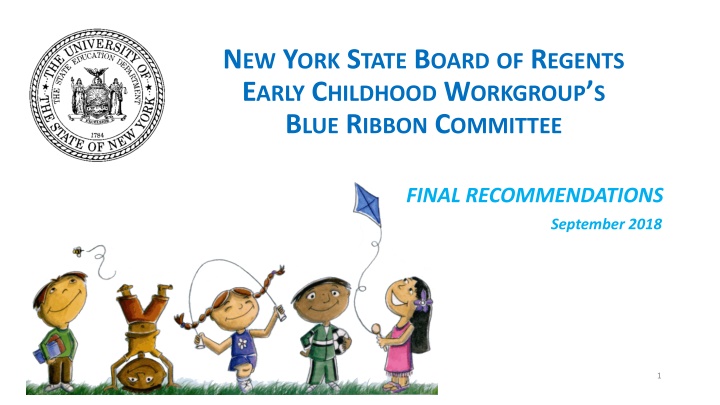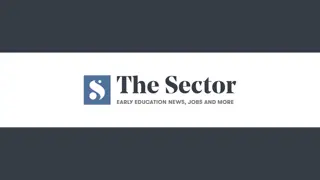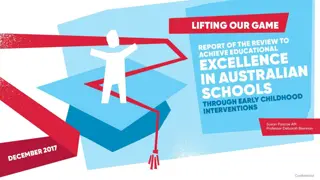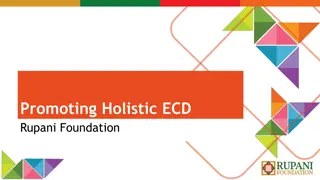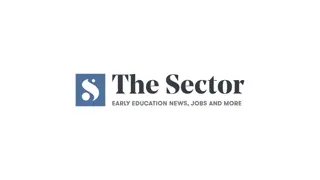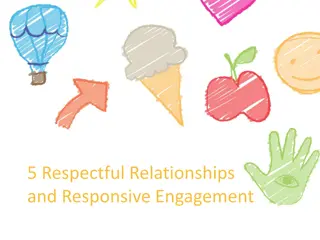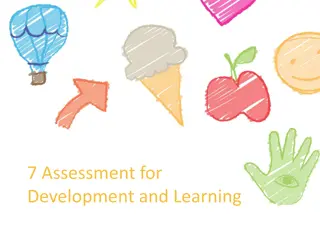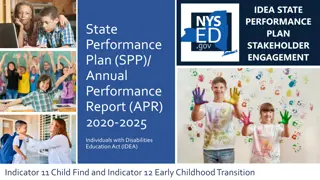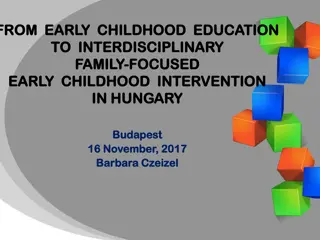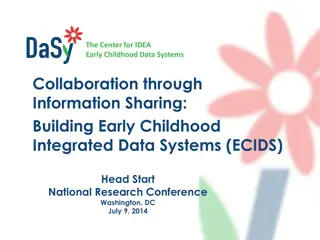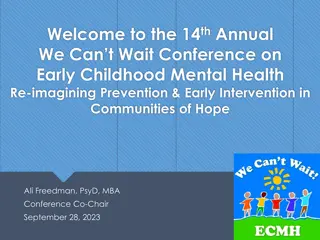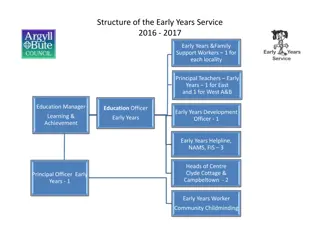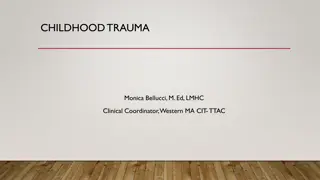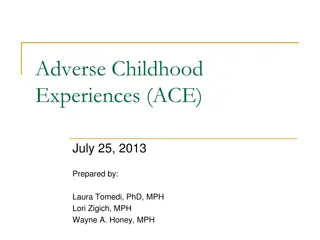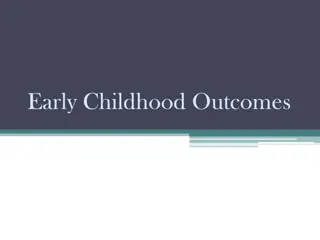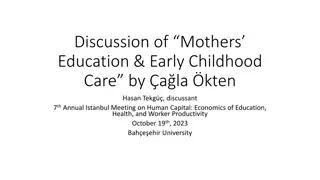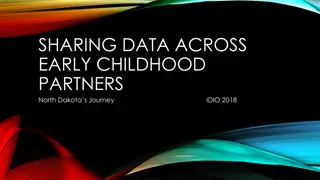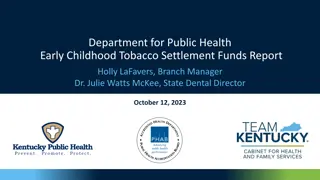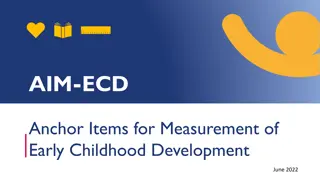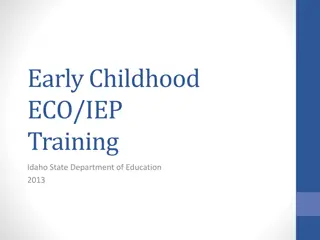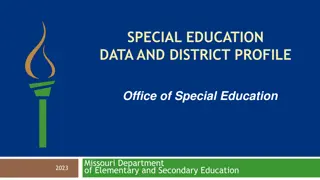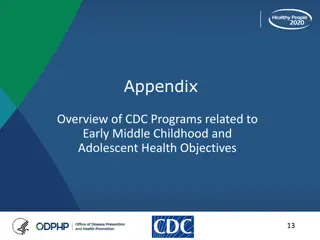Transforming Early Childhood Education in New York State
The Early Childhood Workgroup's Blue Ribbon Committee in New York State has put forth final recommendations to improve the early care and education system for children aged birth to eight. These recommendations focus on funding expansions, promoting blended learning, enhancing family engagement, implementing comprehensive screening processes, supporting multilingual learners, and developing behavior management practices.
Download Presentation

Please find below an Image/Link to download the presentation.
The content on the website is provided AS IS for your information and personal use only. It may not be sold, licensed, or shared on other websites without obtaining consent from the author.If you encounter any issues during the download, it is possible that the publisher has removed the file from their server.
You are allowed to download the files provided on this website for personal or commercial use, subject to the condition that they are used lawfully. All files are the property of their respective owners.
The content on the website is provided AS IS for your information and personal use only. It may not be sold, licensed, or shared on other websites without obtaining consent from the author.
E N D
Presentation Transcript
NEW YORK STATE BOARD OF REGENTS EARLY CHILDHOOD WORKGROUP S BLUE RIBBON COMMITTEE FINAL RECOMMENDATIONS September 2018 1
Vision of the Early Childhood Workgroups Blue Vision of the Early Childhood Workgroup s Blue Ribbon Committee Ribbon Committee To transform the birth to age eight early care and education system in the State of New York. We envision a New York where ALL CHILDREN thrive from birth, flourish in preschool, enter the school age program on a trajectory of success, and are academically proficient in third grade by growing up healthy and having opportunities for high-quality early learning experiences that are culturally, linguistically, and developmentally appropriate. 2
Final Recommendations of the Final Recommendations of the Blue Ribbon Committee Blue Ribbon Committee A total of 18 Final Recommendations are being advanced for consideration. Of these recommendations, nine require Budget approval. These budget recommendations were presented to the Board of Regents in December 2017 and included in the Regents Budget Priorities for the 2018-19 State Fiscal Year. The remaining nine recommendations would need a change in legislation or education policy. Recommendations are grouped according to the following three topics: Comprehensive Services for Children and Families Strengthening the Early Childhood Workforce Statewide Supports and Infrastructure 3
RECOMMENDATIONSFOR COMPREHENSIVE SERVICESFOR CHILDRENAND FAMILIES Fund Prekindergarten Expansion (Budget): Provide $20M to expand the Prekindergarten Program to approximately 2,000 four-year-old children ($15M was allocated in the FY18 Budget). Promote Blended Learning (Budget): Provide $6M for pilot programs to target funding to 10-month and summer inclusion prekindergarten programs for three- and four-year-old children. Cultivate Local Community and Family Engagement (Budget): Provide $2M to give targeted communities the opportunity to meet their specific family and community engagement needs. Require Full-Day Kindergarten (Legislation): Require full-day kindergarten in all school districts across the State, which will include lowering the compulsory age for education from 6 years old to 5 years old. 4
RECOMMENDATIONSFOR COMPREHENSIVE SERVICESFOR CHILDRENAND FAMILIES Implement a Multi-Agency Comprehensive Developmental Screening Process (Budget): Provide $700,000 as a first step toward the implementation of a comprehensive developmental screening process for all children ages 0 to 8. Support Emergent Multilingual Learners (Education Policy): Revise the Commissioner s Regulations, Section 151.1, to include the identification of children enrolled in Prekindergarten who speak languages other than English in their homes as Emergent Multilingual Learners. Develop Statewide Behavior Management Practices (Education Policy): Hold a convening of NYSED and OCFS staff to discuss best behavior management practices for staff to mitigate and ultimately eliminate Prekindergarten suspensions and expulsions, and leveraging lessons learned in existing successful initiatives. 5
RECOMMENDATIONSFOR STRENGTHENING THE EARLY CHILDHOOD EDUCATION WORKFORCE Elevate Teacher Preparation and Professional Development (Budget): Provide $2.5M to adopt and implement a competency-based approach in pre-service teacher preparation programs and in-service professional development. Develop Career Pathways for Early Childhood Educators (Education Policy): Improve retention of the workforce by creating a comprehensive, statewide strategy to assist and incentivize current and aspiring early childhood educators, including special education teachers, and ancillary staff to advance along the State s career pathway ladder. Strengthen Teacher and Leader Preparation (Education Policy): Develop collaborations between NYSED s Office of Higher Education and Institutions of Higher Education teacher and leadership preparation programs to include culturally responsive family and community engagement principles and best practices. 6
RECOMMENDATIONSFOR STRENGTHENING THE EARLY CHILDHOOD EDUCATION WORKFORCE Recruit a High-Quality Workforce (Education Policy): Recruit a diverse workforce of educators and providers who possess core knowledge and demonstrated competencies including cultural competency, from diverse backgrounds by creating partnerships, beginning at the high school level, who reflect the race, background, and/or culture of the students they may teach. Develop Concentrations in Early Childhood Teacher Certification (Education Policy): Change teacher certification requirements in the existing birth-2nd Grade certificate to allow teacher candidates to choose a concentration in infant/toddler, Pre-K, 1-2, Bilingual Education, Special Education, or a combination thereof. Revise School Leader Certification Requirements (Education Policy): Change the certification for school leaders by requiring that school leaders (preservice) submit a certificate of completion of 8 hours each in special education, multilingual strategies, developmentally appropriate practice, and trauma-informed support. 7
RECOMMENDATIONSFOR STATEWIDE SUPPORTSAND INFRASTRUCTURE Establish Early Learning Technical Assistance Centers (Budget): Provide $2M to establish five Early Learning Regional Technical Assistance Centers (TAC) to provide support to early care and educational settings. Conduct a Cost Validation Study (Budget): Provide $300,000 to conduct a cost study to validate the actual cost of a high-quality prekindergarten program for all four-year-old children. Fund Expansion of QUALITYstarsNY (Budget): Provide $3M to expand the availability of QUALITYstarsNY throughout the State by improving assessment tools and staff support; strengthening the existing system; improving coordination by leveraging all resources available for quality improvement; and expanding the number of programs and classrooms receiving support from QUALITYstarsNY. 8
RECOMMENDATIONSFOR STATEWIDE SUPPORTSAND INFRASTRUCTURE Create a Multi-Agency Data System (Budget): Provide $500,000 to fund the first step toward the creation of a unified HIPAA and FERPA-compliant data system. Address Prekindergarten Transportation (Education Policy): Establish a cross-system Transportation Workgroup to inform policy that will address issues related to transporting prekindergarten children. 9
SUMMARY These Recommendations are a first step in achieving the Regents ambitious vision for early care and education in New York. The Regents five-year phased-in approach to support and advance policies will prioritize children with greatest need and will require a coordinated effort with other State agencies and initiatives. These efforts will result in high-quality early childhood and education programs throughout New York State that recruit and retain highly effective, culturally responsive, and linguistically-prepared educators, and ensure young children get a healthy start from birth, become ready for kindergarten, stay on track to graduate from high school, and are successful in life. 10
Timeline for Implementation Timeline for Implementation September 2018: Approval of recommendations by Board of Regents Final report to be printed and released October - December 2018: Strategize with key State agency heads to jointly present recommendations Present recommendations and final report to key legislators and the executive Begin meeting with education advocates (NYSCOSS, NYSSBA, SAANYS, etc.) January - April 2019: Continue to meet with the legislature and executive on recommendations needing budget approval January - June 2019: Continue to meet with the legislature and executive on recommendations needing legislative approval 11
